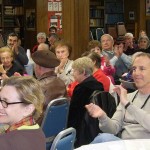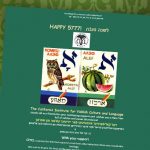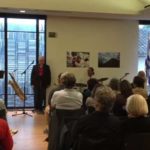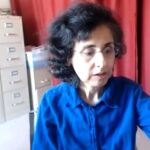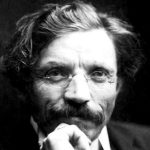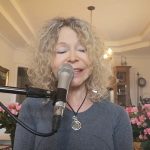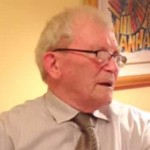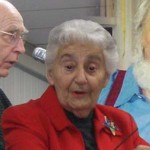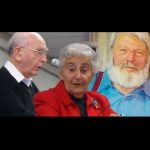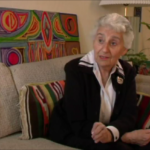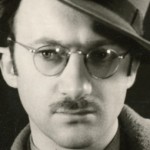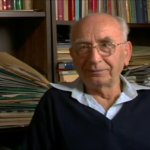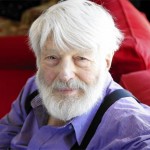By Moshe Shklar
Translated by Miri Koral, April 2010
Remarks About Avrom Sutzkever
When I received the tragic news about the death of the great Jewish poet Avrom Sutzkever, I was reminded of my first encounter with him, many years ago, far, far away in the Warsaw Yiddish Literary Union on 13 Tlomatsky Street, which was famous throughout the entire Yiddish-world at that time. Today that Yiddish Warsaw no longer exists, not even a trace remains of Tlomatsky 13, but for me there has remained, as if alive, that first encounter, and many years later, in another world and in another time, I recalled that encounter in a poem, written in honor of the poet’s 80th birthday, and here are a few lines of that poem:
- …Like moons the lamps fade out
And suddenly I hear a familiar name called out…
Near me, a shoulder turns about
Crowned with –
A head of hair unkempt
And a radiant countenance.
It’s him –
The young songster of my generation
As from a songbook emerges.
An interval of evening darkness
My gaze captures the light
Of his eyes,
And like his song
I gathered up the light
For all the crossroads of my life…
Now the light has gone out, but the song has remained and etched in our folk’s memory for generations to come is the name of its radiant troubadour Avrom Sutzkever. And here it needs to be mentioned that his name, Avrom Sutzkever, is interwoven with the city of Vilna, which is known in the Jewish world as Jerusalem of Lithuania, and, of course, with the literary group “Young Vilna” to which belonged Chaim Grade, Leyzer Wolf, Elkhanen Vogler, Shmerke Kaczierginski, Peretz Miranski, the young Hirsh Glick, and a number of lesser known writers and poets. And though this group “Young Vilna” didn’t proclaim any ideological or literary esthetical manifestos, as for example, “Di Yunge/ “The Youth” and “Di Inzikhistn”/”The Introspectives” in America, or “Di Khaliastre/The Gang” in Poland, it occupied an important place in the history of Yiddish literature and in its development.
The aforementioned groups came to Yiddish literature with shturm and drang, their intent being to overthrow the “old gods”, to deliver the literature from its stagnation and to find new forms of expression, in accordance with the new times and new winds that were blowing in world-literature. And this is what united them, though not for long. In time each one of them found their own individual path.
The Young Vilnas were from the beginning singular in their creativity and themes. It seems that there’s a vast difference between, for example, Shmerke Katczierginski’s “Parents and Little Children are Building Barricades”, or Vogler’s wanderings between “Birch Trees by the Highway”, which are full of images and unexpected metaphors, and Sutzkever’s “Valdiks” (“Foresty”), which breathes with youthful freshness and belief in tomorrow. And yet something united them – God–given talent and extraordinary love for Jewish Vilna and the Yiddish word. It was this love that each one – together and separately – carried with them throughout their lives, and that the last of the great singers, Avrom Sutzkever, carried with him until his last breath.
So now it’s time to focus on the living Avrom Sutzkever, even though physically he’s no longer here on our earth; to recollect this last of the Yung Vilna, who in his creative achievements attained the highest ranks of poetical craft and who achieved recognition far from the confines of Yiddish literature thanks to his work being translated into different languages.
On the occasion of Sutzkever’s 80th birthday, in 1993, a special issue was published in Tel-Aviv of the journal “The Golden Chain”, which was established by him in 1948, after his arrival in Israel. In the over 170 pages are included essays, poems, tributes, and memoirs of around 20 Yiddish writers about the birthday honoree, and from all this one gets a rounded picture of Sutzkever’s creative path, his steady ascension on the literary ladder, until his arrival at the very top of Yiddish, and not only Yiddish, poetry of our day. It’s difficult to add anything to this, but I will cite from it a small fragment from the writer Abraham Karpinovitsh’s memoir of his fellow landsman, that has a bearing on Sutzkever’s biography.
“…Sutzkever was born in Smorgon, a little town not far from Vilna, but during the first World War, he was taken to Siberia by his parents. After the War he returned to Vilna, which became his home town. Sutzkever lived on Shnipeshik with his mother in an old wooden house. A window of the small dwelling looked out over a neglected meadow to the Viliye River. It was through this window that the poet saw the entire world in the dazzling shine of snow, and in the spring, of apple trees. In accordance with his pedigree, he should have become a Rabbi. His grandfather was the famous Mikhaelishki Rabbi, who was renowned among Jews for his genius. Sutzkever however was drawn to the fields around Vilna, to the beauty of nature, because he was destined to become a poet among Jews. And as a poet from the start he extolled the beauty of Vilna. He walked the streets of Vilna like Byron the streets of London, like Pushkin the streets of Petersburg. “
This much from Sutzkever’s landsman. Certainly we could spin the thread further and mention the poet’ssubsequent life’s path which was soon not strewn with roses, but laden with stinging thorns, the path from the Vilna Ghetto and partisan-forest from which he was taken to Moscow and there met with the most important Soviet-Jewish writers, later victims of Stalin’s murder-machine; his bearing witness at the Nuremberg Trials; and in the end, his years in Israel, where he endured all the wars against the Arab invaders, where he was again witness to the shedding of Jewish blood, but also to the enormous construction carried out by Jewish hands.
If one follows the life path of the poet Avrom Sutzkever, one can clearly see traces of all these events in his works, but sublimated through his masterful pen, sometimes in verses elevated to philosophical doctrines, sometimes shocking in their dramatic tragedy, but always lifted by profound lyricism and esthetic beauty. And all of this adorned by the mastery of the Yiddish word, which by him is always fresh as spring as is the “Fiddlerose” (according to the name of the poet’s masterwork), with the control of a Maestro.
In 1953, when Sutzkever already had behind him a sizeable oeuvre, which had put him at the top of the Yiddish literary world but when he still had before him a long course of new creations and achievements that shaped his position in world poetry, the great poet and Sutzkever’s predecessor H. Leivick wrote to him in a letter, “About Sutzkever much is written and will be written, but the best thing is to read his poems and to feel the special flavor present in his word-music, to marvel at the beauty and the internal tragedy that he draws from our Yiddish.”
Therefore we will indeed try to read a little of Sutzkever. Read and be in awe. But also understand! Because in the entire beauty and musicality of his verse he is also often complex. Because he is revelatory in word and image, his poem creates a special atmosphere not so much with the set lines – sometimes straight, sometimes broken – but with that which is between the lines, not with what is stated, rather with what is not stated, with the implied, with the allusion…
In a poem, “The Sculptor”, Sutzkever says, “Music, you breath of statues – wrote Rilke/in my view I’d turn it around:/sculptures are the breath of music”… The poem from the book “Ripe Faces” reminds one of the poet’s initiation when Yiddish literary criticism embraced him with open arms, but some saw in his poetry a Hellenistic, ancient Grecian beauty of sculptures that breathe with a certain coldness, in contrast to the mainstream of Yiddish poetry at that time, also in those of Yung Vilna, which distinguished itself with its hot breath, with the stifled scream and social protest, with religious belief in the God of Abraham or in the God of revolution…
This must have been the reason why at the start Sutzkever stood apart from the Yung Vilnas, because from the start he went his own way. Only later did he become, along with Chaim Grade, the symbol of the wonderful stream that Yung Vilna brought into Yiddish literature in the 20th century. It seems that not everyone at the time accepted the words of Sutzkever’s poem dedicated to the great Polish poet Cyprian Norvid, who died a poor lonely man in the Paris immigration: “There is such a twining of sound and pure image/when a scratching pen becomes – a fiery paint brush”. This is the basis of Sutzkever’s poetry – a fiery paint brush, not a cold statue.
And his fiery paint brush is dipped in the music of the Yiddish word, which together forms a wonderful symphony of sounds and colors.
Here, for example, is the poem “Ecstasy” from his book “Valdiks” (Foresty”) which was published right before the War:
- “The painter lifts his pallet—
The colors tremble:
Blue gazes at the sky
Green smooches with the forest-nascent,
Violet sprays the little hills
Red bonds with blood,
And the others, even they
Radiate filamentous roots
That twine with their
Remote, primordial soul.
This poem certainly doesn’t need a commentary. One must only listen to the verses and immerse oneself in the atmosphere of the colors that radiate filamentous roots, and then we can be grateful to the poet-painter who makes the colors tremble together with our hearts.
This was the beginning of Sutzkever’s creative path. He himself was a part of the surrounding landscape, exactly as the aforementioned fellow Vilner describes, “I see him walking the streets of his home town, lean, slender, with a thick dark-blond head of hair and a pair of light-blue eyes. He climbs the Shishkin Hills in order to breathe into his eyes all of Vilna, spread out before his feet with its magic and charm.”
Is it then a wonder that such cheerful lines escape his pen, as in the poem, “Around the Fires”, written in 1935, just four years before the terrible destruction that overcame his home town and the Jewish people, bringing a cardinal change to Sutzkever’s creativity, that would transform the singer of the “Blond Dawn” into the lamenter of his murdered people, into the author of “Secretcity”, “The Teacher Mira”, “The Lead Plates of the Rom Press” and hundreds of other poems dedicated to our Holocaust..
Locked up in the narrow ghetto-alleys, tormented by hunger and need, witnessing the demise of his people, who were taken by the Germans to Ponar’s mass graves, the poet’s light blue eyes become sorrowful, and sorrowful also his song which would from now on “become stuck like red-hot needles in the soul”, as Sutzkever expressed in writing years later about a Yiddish poet – words that are so appropriate to his own poetry after the Holocaust.
The poet who was destined to endure along with his folk all the circles of hell and become the witness and reminder, didn’t “stand around with his arms folded”, as sang the folk-poet Mordechai Gebirtig even before the War. He became a part of the united Jewish fighting organization in the Vilna Ghetto and along with his childhood friend, Shmerka Kaczierginski, attempted to rescue the treasures of the Yiddish Research Organization, YIVO, so that they wouldn’t be lost to the future. But first he himself created for the future. In the horrible conditions of the Ghetto darkness arise his songs and poems that breathe with profound tragedy, but also with such humanity and heroism.
Sutzkever writes about that time in the forward to his book “Poems from the Sea of Death”: “When the entire sun, it seems, was transformed into ash, I believed with complete faith, as long as the poem doesn’t abandon me, the lead won’t vanquish me. As long as I remain, surrounded by death, living as a poet, my tribulations will be redeemed and repaired.”
And there was no lack of sufferings. Every day brought new woes, new hurts and torments. One more terrible than the other. In June 1941 Vilna was taken over by the Germans and soon the ghetto was formed, fenced off with barbed wire. And in December of the same year Sutzkever writes the moving poem “To A Friend”:
- “Murdered friend
By the barbed fence –
You yet press to your heart
That thin slice of bread.
Forgive my hunger
And forgive my nerve –
I bit into your bread,
Your blood-stained bread. - ————————————
- If I should fall like you
By the barbed fence,
Let another swallow
My word, as I your bread.”
So Sutzkever’s destiny was to survive; he didn’t fall at the fence. And today we swallow his words, the words of woe and nerve, and though they arouse so many painful reminiscences, they also arouse faith in the future of mankind and Jew. But it is painful that the “swallowers” are becoming fewer and fewer. Sutzkever’s poem will however tear through and reach the future generations!
In one of his Siberian poems, which describe the atmosphere of a hut, a little faraway village among the Siberian steppes, the poet writes:
- “Knife. Father. Smokey hearth.
Childhood. Child. A shadow takes down
The fiddle from the wall. And dim-dim
Snowsounds land on my head.
And in another poem:
- “Above me Father stands bent over –
My tall father from Siberia.
I feel the touch of his elbow,
I see the shadow reflection on the door.”
It seems that this touch of his father’s elbow is what Sutzkever feels all his creative years, just as he hears the echo of the fiddle that his father takes down from the wall and “snowsounds land on his head”. From these snowsounds will probably later, after many years, bloom Sutzkever’s “Fiddlerose”, which is considered to be one of his highest poetic achievements.
In another place, in another time, Sutzkever will write: “My father’s heart at age thirty burst while playing Rev Levi Isaac’s melody on a fiddle one evening. His body fell on the hands of the seven-year old boy and…in that moment was birthed in me the poet. I sensed: Somewhere there dozes in my flesh a kernel that carries in its innards a pre-determined purpose.” It must be remembered that this “pre-determined purpose” was sensed by Sutzkever when he was no older than seven, at the time when he became an orphan. And he carried out the mission honorably in all his work, he carried it out through all the fires and flames.
So we jumped ahead on the poet’s creative path in order to identify the origins of his poetry. Now we’re going to return to the most crucial period in his creativity, the time of the Holocaust, of the annihilation and resistance of our people during the war against the Nazi beast. And since we spoke about the father-motif, Sutzkever’s poem about his mother who perished in the Vilna Ghetto must also be mentioned. He wrote it in October 1942. And it is to be marveled at: all around is death and destruction, hunger and deportations, and the poet finds in himself enough strength to describe an almost idealistic scene of Friday evening, in order to subsequently, through a sharp contrast, bring out the full hurt and anguish of losing this most beloved person:
- “There is cooing one Sabbath eve in the attic,
You gaze into your prayerbook by the moon limned.
The edges of your patch are swaying in prayer
And twitch so like human limbs. - The moon seeps from your pupils
Maternal drops illumining my faith,
Your prayer reminds me of warm challah,
You nurture the doves with your prayer’s depth. - ___________________________________
- Instead of you I find your torn nightgown
And gather it close to my heart, ashamed.
The holes of the gown my days become
And like a saw in my heart is its hem. - I tear the clothes from my body and crawl
Into your open naked gown as into myself
No longer a nightgown, it’s your bright skin,
It’s your cold, your ongoing death.
I don’t know if in the entire world of poetry or even world literature, beginning from the ancient Greek tragedies to our time, whether we would find such disturbing, dramatic lines, as those above that could have arisen only in that nightmarish time of the ghetto.
If you read these lines, and many others, as for example, “Only a Job wails from the uttermost soul-depths /then have you, dear mama, grown accustomed to death?” lines that came out of Sutzkever’s bloody pen, and not only Sutzkever’s. So a question gets posed again and again: How can poems about annihilation and death be so encompassing, disturbing, and also so beautiful, rhythmic, full of imagery?Could it be a weakening of death itself? Were there actually writers and literary theorists, not just Yiddish ones, who proclaimed that after the Holocaust, after the hell that humanity endured, after Auschwitz, Treblinka, Babi Yar and Ponar one can’t, one mustn’t write as before, as if nothing had happened? Some have even actualized it in the practice of limiting themselves to spare, half-prose lines, devoid of rhythm, rhyme and image, where only the word must carry the entire poetic weight. Therefore it’s really difficult to read such poetry and to digest it. Indirectly one finds a response to this in Sutzkever’s poem, where he writes, “Death itself is frightened of beauty”, and he gives proof to it in another poem in which he describes himself, lying hidden in lime-water: “I’m lying in it sunken/ half-drowned/ and from me emerge such fluid rubies,/seeping, pouring,/in verse, like song/and plant a smiling-pink sunset in the lime.”
No, the poet doesn’t stop being a poet in the most horrible conditions, when death looks in one’s eyes a hundred times, not in the Ghetto and not in the partisan woods. On the contrary, the poetry, the awareness that with his word he creates new worlds, that with his word he can overcome the unavoidable end and merge with eternity, helps him endure. When he thinks that everything is lost, that there is no way out, the poet observes, or summons, the “smiling-pink sunset in the lime”…and that’s when he likely arrives at the awareness that this poetic word is stronger, mightier than time, that is the passage of time, which he will later give expression to in various forms, as in one of the “Poems From My Journal”,
- Transform time I will, into spirituality, that’s my idea!
Transform death I will, into life: I, the long-destroyed.
Transform grass I will, into a cosmic avenue,
Transform myself I will, into someone more dear. “
Transform death I will, into life…this is the transformation Sutzkever achieved in his immortal poem “Secretcity”, a poem written in heart’s blood, in blood that seeps from every line, and yet is a work that doesn’t lead one to despair, but awakens hope, because it reveals the slenderest traces of humanity where one imagines man can be transformed into a beast…but the beast, the wild animal, is in the “upper world”, the beast in the uniforms of the German S.S., lurking over the remains of the Jewish people condemned by the master race to annihilation.
In the underground water channels of the Vilna Ghetto the poet creates his own world, the secretcity in which is assembled a symbolic minyan of Jews, a folk of ten people of various characters and social origins, an actual cross-section of Jewish Vilna. Here is the teacher Gedalia, the farmwoman Esther and her son Folia, the refugee from Hamburg Aaron, and the Doctor Lipman, the pious Jew Rev Nathan, the young girl Debbie, a blind Jew, the pregnant woman Kreyne, and the tenth — the poet himself. Here one lives in hunger and stink from sewer outfalls, but one doesn’t forget to celebrate Yom Kippur and Passover; when hunger gets to the point of being unendurable one finds sustenance in blood that runs down in the channels from the slaughterhouse.
At night they steal into the hollowed out city in order to find food. There are conflicts, a collision of diverse temperaments; someone dies and a child is born – a promise of new life. Few survived, exactly as befell the entire Jewish people in Eastern Europe during the Holocaust. But the poet ends his Secretcity-epic with a symbolic finale. Esther’s son Folia, who got out of hell alive, after the liberation of Vilna goes to Ponar, where the Germans slaughtered the most Vilna Jews, and there he hears the martyred speak to him:
- Go, Folia, in peace and be the messenger
Of all those forged in earthly chains –
The King Messiah you will encounter
and you must escort him to this abyss. - Fill a little sack with dust, fulfill
The longing of this interrupted seed
And spread it in Jerusalem,
So that it flower there, amen.
So he went, did the poet, as the martyrs demanded of Folia, and reached Jerusalem, and carried with him the living image of his destroyed home city-secret city, Jerusalem of Lithuania, and his entire ensuing work is shot through, as with a golden thread, with Vilna – the city and people of Israel… I don’t need to remind myself – writes the poet about his Vilna – “You yourself are my memory./I’m a sundial in the desert and my creation is the hand/throughout my life it’ll circle around this sundial/ and bewail your loss, and your dwellings lament”.
Fortunately, neither the Holocaust nor its themes swallowed up the poet, even though he returns to it endlessly in his poetry and also in his wonderful poetic prose. He created in the fruitful Israeli soil a prolific array of new poetical works in which he attained the highest degrees of mastery. Once again he looks upon the world with the penetrating gaze of a painter who sees the transitory and the eternally renewing, and with the ear of a musical virtuoso hears the faintest sounds of perpetual movement, of perpetual becoming. And he transforms all this into words, into the Yiddish word that emerges from the tip of his pen fresh and young, new and renewing, as for example, as in one of his verses,
- “A swan gives birth to a swan and both swim,
Where to? To you, through you, with white marveling
That marvels just for your sake above all.
Bow before the marvel and marvel.”
One wants, therefore, along with the poet, to bow before this marvel that he extracts from the Yiddish word. We have here poetic beauty of another kind. It’s not the beauty that some find nauseating because of its contrast to the cataclysmic thematic, but that beauty that comes from the integral blending of word, image and musical sound; a blending that is created thanks to the masterful alliterations. It is expressed more clearly in another poem, that is again dedicated to the poet’s mother: “Not extinguished by a black wind,/ were my mother’s Sabbath candles./As lighted as presently lit /My mother her Sabbath candles. “
Even a deaf ear can hear the music of these few lines. But the beauty of the verse alone is not what the poet plays with. He uses the Sabbath candles as a symbol of Jewish perpetuity, of carrying on the Jewish tradition from generation to generation that is not transitory. “What is time? A thin pane/compared to mother’s Sabbath candles” – he writes in the same poem.
*
The well-known Yiddish-French poet Charles Dobzhinsky, who translated into French a number of Sutzkever’s works, refers to him as a phoenix, the legendary bird that is burned and arises again from the ashes. And Sutzkever too writes about himself: “I am myself the burning tree. I burn and feed/the fire with my own flesh.” Just like our people, arising from the ashes, feeding the fire and coming out hardened from the flames, only to bring forth new branches and blossoming, like Sutzkever’s tree.
The folk is always before the poet’s eye and he has faith in its endurance even in the most terrible, tragic times. “…among the peoples you are a demand” – writes Sutzkever in his “Consolation Poem”, written in the Vilna Ghetto in 1943 –“It doesn’t matter whether you know or you don’t,/axes won’t chop you,/ no wheel will ride over you.”
This particular faith in the Jewish folk by the one who demands and reminds can be taken as the last words of the great poet whose work the folk will always remember!







